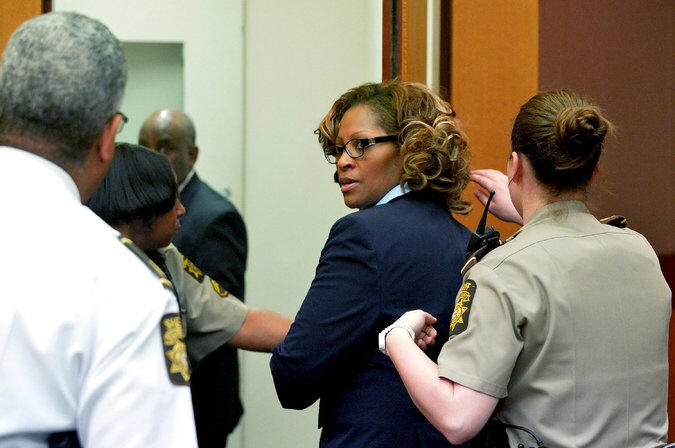 Photo: New York Times
Photo: New York TimesATLANTA SCHOOL EMPLOYEES TRIED AND SENTENCED IN CHEATING SCANDAL:
In April 2015 eight school workers in Atlanta who had been tried and convicted of racketeering, and who had declined to take deals for punishment, were given stiff sentences. The three administrators involved were given 20 years with seven years in prison and the remainder on probation. Additionally they have to pay a $25,000 fine and perform 2,000 hours of community service.
 Photo: New York Times
Photo: New York Times
It's high time a court somewhere finally did what needed to be done a long time ago.
Texas, Houston and Katy have all had their fair share of teachers and administrators who may have flaunted the law regarding standards testing.
In Katy ISD, it was suggested in the past that parents keep their children at home so they wouldn't have to take the test. There was a petition to that effect that was brought to the KISD school board. If I recall, one of the Board members signed it! Perhaps that petition may have been more of an objection to the test itself than an attempt to keep students who would not do well from taking it. But even so, it was not an honest proposal in my opinion.
Others suggested that the high number of special education students at one school was a device for not allowing those students to take the tests thus upping the scores of the entire school.
And then there were high schools that appeared to hold students back as ninth graders so that they wouldn't have to take the test as 10th graders until the school thought they were ready.
No charges were ever filed or even suggested.
Of course all of this business is caused by a stupid testing program brought to America by Hillary Clinton and the Bush family. Those tests are NOT real tests, they are assessments which means the Feds are just trying to see if the dumbed down curriculum that they want in place is being effectively delivered! "Passing" with regard to standards "tests" means that the students have been successfully dumbed down!
The last REAL standardized test that was given to Katy ISD students was in about 1991, --the Iowa Test of Basic Skills, and KISD students were neither great nor awful but just average like all other school districts. (There used to be no manipulation of scores or passing levels in those days, and so parents could get a pretty good grip on where their children stood in relation to other students.)
Perhaps if the public begins to see how ridiculous the test is, and if legislatures stop making the test a means of giving school employees more money for the scores of their students, then the testing itself will cease to exist. It certainly has no value as far as I'm concerned.
Read about Atlanta's court case:
Atlanta school workers sentenced in test score cheating case
Eight of 10 ordered to serve one to seven years in prison
By Richard Fausset, NEW YORK TIMES April 14, 2015
Fulton County Superior Court Judge Jerry Baxter ordered eight of 10 Atlanta public school educators convicted of racketeering charges in a test-cheating scandal to serve between one and seven years in prison.
ATLANTA - Rejecting sentencing deals urged by the judge, eight of the 10 educators convicted of racketeering in a public school cheating scandal were given stiff prison terms Tuesday, the latest chapter in a case that has gripped the Atlanta region and raised questions nationally about the use of standardized testing.
Despite emotional pleas for leniency, Judge Jerry W. Baxter of Fulton County Superior Court imposed sentencing ranging from one to seven years, with three high-level administrators getting the longer prison terms. The sentences appeared to be more harsh than educators convicted of similar incidents elsewhere and exceeded what criminals can get for some violent crimes.
"I wish that it had been different," the district attorney, Paul L. Howard Jr., said Tuesday, adding that he was "frustrated" and "disappointed" that more of the educators had not accepted deals.
Sentencing had been expected Monday, but after spending most of the day listening to character witnesses - friends and family members - Baxter asked prosecutors and defense lawyers to try to work out agreements.
Plea Bargains
In the end, only two accepted sentencing deals.
Donald Bullock, a testing coordinator, was ordered to spend six months of weekends in county jail and five years on probation. He was fined $5,000 and ordered to do 1,500 hours of community service.
The other, Pamela Cleveland, received five years of probation and one year of home confinement in the evenings, as well as a $1,000 fine and 1,000 hours of community service.
Among those declining deals were regional directors Sharon Davis-Williams, Michael Pitts and Tamara Cotman. An irate Baxter sentenced each of them to 20 years, with seven to be served in prison and the remainder on probation. Each must pay a $25,000 fine and perform 2,000 hours of community service.
The judge ordered all of the educators freed on bond from county jail, where they had been since their conviction. Several defendants on Tuesday vowed to appeal their convictions, ensuring that Atlanta, a majority-black city, would continue to grapple with two harrowing and interrelated questions: How much mercy is due to an all-black roster of educators with spotless records? And what kind of justice is due to the thousands of mostly poor, minority students whose falsely inflated standardized test scores obscured their need for extra help?
'Justice and mercy'
"We've sent a horrible message about character in education," Bernice King, the daughter of the Rev. Dr. Martin Luther King, Jr., said at a news conference called by prosecutors, in which she exhorted residents to pray for the defendants' families. "The balance between justice and mercy is always weighed in my heart."
The deals offered to the 10 defendants by the Fulton County District Attorney's office were predicated on their admission of responsibility and the waiver of their right to appeal. Most of the defendants found the terms unacceptable, and lawyers for some clients said they were sure the convictions would eventually be vacated.

"The sentence is fair," said Gerald A. Griggs, who represented a teacher, Angela Williamson, who was ordered to serve two years in prison. "The fact that she only got two years in custody, that's fair considering what the jury's decision was, but we still respectfully disagree with it, and we will be successful on appeal."
The others who declined deals were also given various levels of fines and community service. They included a principal, Dana Evans, who received a five-year sentence - a year in prison and four years of probation; Tabeeka Jordan, an assistant principal who received two years in prison and three years' probation; Diane Buckner-Webb, a teacher who received one year in prison and four years' probation; and Theresia Copeland, a testing coordinator, who received one year in prison and four years' probation.
One should also read about the superintendent who died before she could be charged with racketeering and tried: http://www.nytimes.com/2015/03/03/us/central-figure-in-the-atlanta-schools-cheating-scandal-dies.html?action=click&contentCollection=U.S.&module=RelatedCoverage®ion=Marginalia&pgtype=article
Some do not understand what racketeering is. In its simplest form it involves engaging in activities that result in illegal acquisition of profit. Thus, in the Atlanta case, the teachers and administrators received additional remuneration because of the good scores on the tests of their students. When it was discovered that these people had cheated and/or caused their students to cheat for the personal gain of the school employees, they were charged and tried and found guilty.
Racketeering can occur in any organization where there is profit to be made from cheating. Employees and participants in school districts, homeowner associations, booster clubs, et cetera are not immune to being criminally charged. Many think that because the organization is not a business that racketeering is something that cannot happen. But it does, and it is illegal.